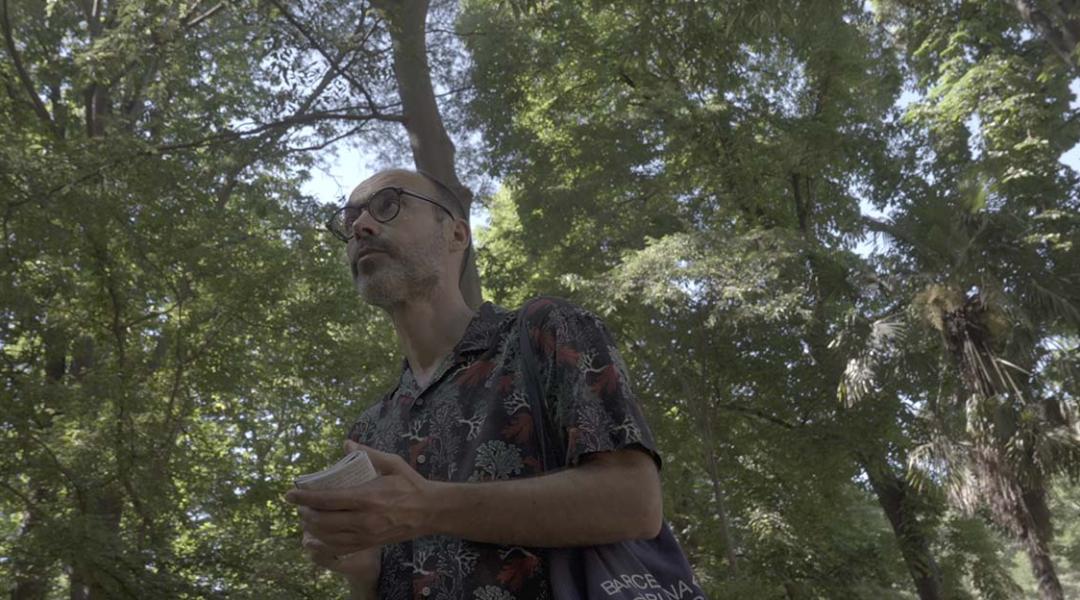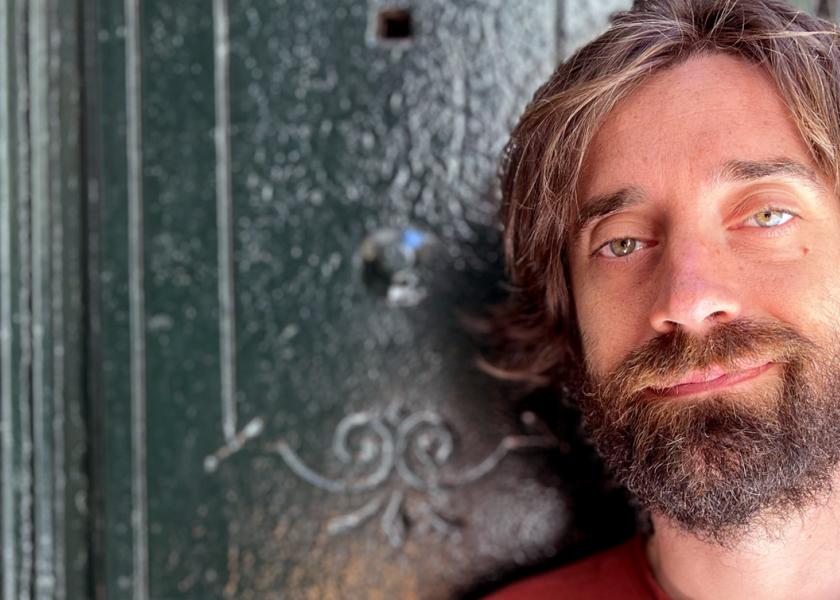Gabi Martínez
Words to save the world

Can a story change the course of our lives? Can we find unknown selves in faraway destinations? Will we be able to learn something about ourselves by following animal tracks? For writer Gabi Martínez, the key lies in ‘liternature’, that literature that seeks to re-establish that missing dialogue between humans and all other living things. Curiously, the wider our gaze, the more connections and meanings reveal themselves.
For fans of travel literature, coming across Gabi Martínez (Barcelona, 1971) is like meeting a legend. Selected in 2005 by publisher Palgrave/MacMillan as one of the five authors most representative of new Spanish narrative, his works, translated into 10 languages, have taken us halfway around the world while discovering the coast of China alongside him (Los mares de Wang, Alfaguara), investigating the death of zoologist Jordi Magraner in the Hindu Kush in Pakistan (In the Land of Giants: Hunting Monsters in the Hindu Kush, Scribe Publications), peering into the Great Barrier Reef in Australia (En la Barrera, Altaïr), herding sheep in the Extremaduran Siberia (Un cambio de verdad, Seix Barral), or looking for hidden or forgotten animals —and ourselves, while we’re at it— across the globe (Animales invisibles, NÓRDICA; Lagarta. Cómo ser un animal salvaje en España, GeoPlaneta).
In his books, whether about travel or what he calls liternature (the combination of literature and nature), Gabi unfurls elegant, clean, and seemingly natural prose, but capable of hitting hard without warning, of leaving you suddenly trembling at the beauty of a poem or the strength of a revelation: “I haven’t tackled poetry as a genre, but I do believe I’ve always lived surrounded by it. I believe that if you let reality flow, if your eyes are looking for the essence, the substance of what happens around you, you’re within poetry and, when you write, it flows on its own,” he confesses.
“Travel books mean going to talk to people who experience reality through other nuances, but who help you to get an idea of all the people that are within you”
The entire ecosystem within your gaze
We meet him at Desnivel bookshop in Madrid, a legendary destination for mountain lovers and those keen on travel. The writer landed in Madrid this morning to open the Madrid Book Fair. He walks in silently, like an invisible animal, and we quickly get a glimpse of some of his other animalistic traits: feelers out, delicate movements, constantly alert... —he carries a notebook with him where he steadily takes notes—.
That curiosity, that eagerness to get close to others and to oneself, is what his entire work is steeped in: “Travel books are nothing more than an extension of that curiosity. It means going to talk to people who experience the reality you live through other nuances, but who help you to get an even better idea of all the people that are within you,” he confesses. “It means including the entire ecosystem within your gaze, trying to learn from anything that happens, honing your senses, your intuition, knowing how to pay particular attention to details and, above all, cultivating patience and nouns. When you see a tree, it’s essential to call it a baobab, or a willow... to name things precisely. That sensual contact with them allows matter to seep into you substantially and for it to be expressed in a cleaner way. To write, you need to internalise what you want to convey,” he adds.
Despite his achievements and recognition, Gabi needed to publish five books to really feel like a writer: “After the fifth book I saw that I have enough narrative strength to introduce myself as a writer. It was at the airport, when I was asked for my profession, when I said writer for the first time.”
“I believe we need to communicate nature in other ways, to reach it through emotions, not through data or scaremongering”
Culture and nature, nature and culture
His steps have slowly led him towards a more activist literature, where nature has taken up more and more space. “There’s a thread between culture and nature that can change things,” he declares. In this second phase, his travels and journeys are shorter, but more intense. For months he settled in the Extremaduran Siberia, the land where his mother grew up, where he lived in the middle of grasslands “surrounded by great bustards and locusts,” without running water or electricity, caring for a flock of sheep. The result was Un cambio de verdad, a delicate and thoughtful book that was a turning point for the writer in many ways. “I thought: I’m going to talk more and more about my home. I’m going to place words that are important to me face to face for the first time: Spain, nature, mother.”
After meeting Miguel there, a shepherd who rears black merino sheep (today a personal friend and business partner), the author starts to activate what he calls code black: black sheep, black Spain, black storks... Strong symbols that he uses to focus on the animals and beings that somehow live on the fringes of the system. “It’s important to defend and raise awareness of alternative animals: that biodiversity and those invisible animals that allow us to exist as human beings and as a society, about which very little is said but which are so valuable, nevertheless.”
Since then, the writer’s commitment to the environment has done nothing but grow. Today, he’s the founding member of Asociación Caravana Negra (whose goal is to promote artistic creation inspired by nature, as well as encouraging the sponsorship of native animals), member of Fundación Ecología Urbana y Territorial, codirector of the Animales Invisibles project and director of Festival Liternatura, an initiative he’s planning on expanding into Latin America shortly: “I think there’s a desire for stories about nature that isn’t met, that hasn’t been offered since Félix Rodríguez de la Fuente. And that we need to communicate nature in other ways, to reach it through emotions, not through data or scaremongering.” His latest work, Lagarta. Cómo ser un animal salvaje en España, precisely brings back the concept of the great work contemplated by Thomas Berry, the need to establish a great dialogue between humans and all other living things: “Because everything is connected, that’s the truth.”
“Literature has given me the power of thought. How something that doesn’t exist can condition you and lead you to the most radical physical action”
Back to the source
If Un cambio de verdad allowed the writer to connect to the land of his mother family, his latest destination, the Ebro Delta, has brought him back to the culture of the sea, to his father. Two people the writer gives a lot of thought to throughout our conversation: “I think that, somehow, unconsciously, my parents have always wanted us to be surrounded by play and culture [he grew up among paintings, toys, and rented films], to be embraced by them. And that’s left its mark, one way or another.”
Gabi has spent the last year living practically in isolation on the Ebro Delta, on the island of Buda, “in the first house before you reach the sea, the first that’ll disappear when the great wave comes. It’s a really interesting border area, where the Catalan sardana and the Spanish jota, the bulls and the sheep, Catalan and Spanish come together,” he tells us. He confesses it’s been a tough year, “with a lot of time to think and observe; among other things, death, religion...” For a moment Gabi breaks, he gets caught up in the fragility of that natural ecosystem he’s already a part of and that he wants to defend.
A reflection that, as always, turns into action: for now, with Caravana Delta, an extension of Caravana Negra where seven national and international artists have shepherded the herds of bulls and cows through the first stretches of transhumance across the Terres de l’Ebre. Tradition, livestock, and culture, again hand in hand. “The world also defends itself by telling stories, painting, filming, singing, sculpting. The communication and beauty created by humans are efficient forms of resistance and, therefore, of collective protection,” he assures us. And that’s exactly how he understands the value of books. “Literature has given me the power of thought. How something that doesn’t exist, or that’s absolutely ethereal, can condition you decisively and lead you to the most radical physical action. That’s what literature has been for me,” he highlights.
Today, Gabi Martínez seems calmer than what his first works let on, as if he’s somehow made peace with himself and found that necessary balance between his artistic impulse and his business side, between those self-imposed standards of excellence that lead him to live on the fringes, on the edge, and his personal life: “The truth is I’m really happy. The way things are going, my tombstone would say: Wouldn’t change a thing”.
Maybe it’s because he’s over 50, or because he’s finally found an endless source of inspiration: nature. “Let a black stork into your life and you’ll see,” Gabi declares in his book Lagarta. We say: Let a Gabi Martínez book into your life, and you’ll see.


